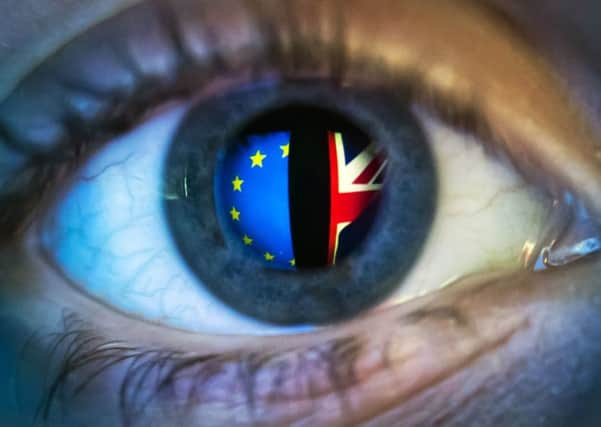Bill Jamieson: Ffigures refuse to look over Brexit precipice


Anyone running an export business, or a company supplying to an exporter, must be at their wits’ end by now. Investment plans put on hold, inward investment seizing up and confidence close to rock bottom: the uncertainty alone must have brought us to the brink of recession – if not the fact of two quarters of falling output.
And yet the figures continue to defy the premonitions of an economic stall. Data released last Friday showed the UK economy performed better-than-expected in November as GDP grew 0.2 per cent month-on-month. This was the best monthly growth rate since July and up from an expansion of 0.1 per cent in October and a flat performance in September.
Advertisement
Hide AdAdvertisement
Hide AdNevertheless, year-on-year growth dipped to 1.4 per cent in November from 1.6 per cent in October.
The growth recorded in November was due in large part to output in the services sector rising 0.3 per cent on the month – helped by retail sales boosted by Black Friday purchases and motor trade gains during the month. GDP growth in the month also benefited from construction output rising 0.6 per cent. A massive round of applause is surely due to the SMEs who have kept their heads down and ploughed on through the Brexit maelstrom. However, industrial production fell 0.4 per cent, with manufacturing down 0.3 per cent
Now, monthly data of this sort comes with heavy caveats, gains in one month are often contradicted by reversals in another. A better guide to the underlying trend is quarterly performance. Here the three-month-on-three-month growth rate to November slowed to 0.3 per cent – the weakest since May, and down from a peak of 0.8 per cent in the three months to August. Evidence since largely points to weak retail sales in December.
And the overall picture may be distorted by forward buying and stockpiling of components and supplies by companies apprehensive about significant disruption after 29 March. The year-on-year fourth-quarter GDP growth of 1.4 per cent – arguably a better guide – would be down from 1.8 per cent in 2017 and the weakest performance since 2009.
So – no fall in overall economic output as yet, while most forecasters see a continuation in growth – albeit pallid. On the basis that a Brexit “deal” is ultimately agreed, the EY Item Club predicts GDP growth to improve modestly to 1.5 per cent in 2019.
But for the moment we are witnessing an evident and growing lack of momentum. Even if there is some dramatic about-turn in Westminster over the next two days and MPs support the Withdrawal Agreement, it would not be the end or even the beginning of the end, but the onset of a further stage in our negotiations with the EU – these on the fine detail of trade agreements – talks that could last for years.
But a humiliating defeat would be to make a general election or a second referendum more likely – injecting yet more division and delay. For households and businesses, this is becoming an intolerable burden.
The small crumb of comfort from all of this is that the Bank of England is likely to hold off from another interest rate hike at least until after the end of March. Indeed, a further slump in consumer and business confidence could see a cut in rates by mid-year.
The £500,000 question
Advertisement
Hide AdAdvertisement
Hide AdSeveral features of the extraordinary Alex Salmond/Scottish Government legal imbroglio have caused me to read the news items twice because I couldn’t believe them the first time. The most outstanding of these has been the figure advanced by the former first minister, Alex Salmond, for the Scottish Government’s costs of its legal advice and services.
A judge at the nation’s highest civil court ruled last Tuesday that the investigation into Salmond had been unlawful, describing it as “procedurally unfair” and “tainted with apparent bias”.
The cost figure injected into these legal fisticuffs is £500,000 – or, to quote sources more fully, the Permanent Secretary, Leslie Evans, has been responsible for the “abject humiliation” of the Scottish government, wasting more than £500,000 in the process.
This to be borne by Scottish taxpayers, and in a period when the Scottish Government has lost no opportunity to bemoan spending constraints, cutbacks and “austerity”.
I pass no comment on the legal rights and wrongs of this matter. But costs of £500,000 – or, as some claim, “more than £500,000” – seem extraordinarily high. And I fear further legal and administrative costs will be incurred before this matter is brought to a conclusion. A Scottish Government spokesman said the case’s legal costs had yet to be calculated and described any estimates as “speculative”.
And Evans said the complaints could still be re-investigated once the police inquiries into Salmond have concluded. Bearing in mind that many MSPs have been fighting for urgently needed money for welfare services and poverty alleviation projects, even £500,000 would be a welcome sum for hard-pressed local budgets. As if to prove the need for urgently needed extra revenue, Finance Minister Derek Mackay has presented a budget that will put a further 29,000 taxpayers into the higher rate bracket.
We should always be on guard for precedent-setting in such matters. For if government ministers and senior civil servants can launch investigations with seeming impunity and still leave the door open for re-investigation should judgment go against them, what is to stop these taxpayer costs from rising far further?
I ask because I do wonder who, if anybody, is representing taxpayers in this matter. Is this a private bunfight at taxpayers’ expense, or can anyone join in? An administration that rails so loudly against austerity needs to be sure it spends with prudence and some sense of limit.